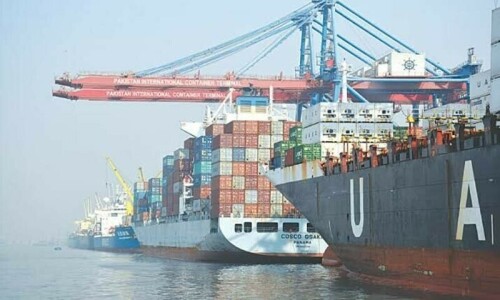TEHRAN, June 23: Iran said on Friday it will stop importing petrol in September and begin rationing it, ironic for a country that is OPEC's number-two exporter of crude oil.“As there is nothing provided for petrol imports in the second half of this (Iranian) year's budget ... the imports will naturally stop and petrol will be rationed,” Oil Minister Kazem Vaziri Hamaneh said on state television.
The minister said imports will end from September 23, and that the government will decide at a meeting next week when to begin the rationing.
Iran's refineries have a capacity of 40 million litres of petrol a day, but demand is close to 70 million litres.
Petrol is extremely cheap in Iran thanks to massive subsidies.
A litre of regular petrol costs just 800 rials (nine US cents, or 34 cents a gallon). Super costs 1,100 rials (12 cents, or 45 cents a gallon).
A surge in car ownership and petrol smuggling to Iran's neighbours, where prices are far higher, has caused an explosion in demand. Iran loses more than $1 billion a year because of the smuggling.
The shortfall has up to now been met by spending billions of dollars each year on imported petrol.
In February, Iran's parliament slashed the government's requested $4 billion budget for petrol imports to $2.5 billion. That lower amount is predicted to have been spent in the first half of the Iranian year, which began March 21, due to higher import prices and increasing consumption.
Parliament subsequently backed a government initiative to put the brakes on domestic petrol consumption by limiting access to subsidised fuel.
The plan was approved during discussions on individual articles of President Mahmoud Ahmadinejad's budget for the current financial year, but has not yet been implemented.
Hameneh indicated on Friday that it would not be put into action, but did not say why.
It stipulated that car owners would be provided with “smart cards” that allow petrol purchases at the subsidised nine cent per litre rates up to a fixed ceiling, above which motorists would have to pay the full price.
The head of the parliamentary energy committee, Kamal Daneshyar, previously said that private cars and taxis would daily receive three litres, and 30 litres, respectively, at a subsidised price.
Analysts have said Iran could prove highly vulnerable to sanctions on its petrol imports, if the United Nations takes tough action over its controversial nuclear programme.—AFP













































Dear visitor, the comments section is undergoing an overhaul and will return soon.